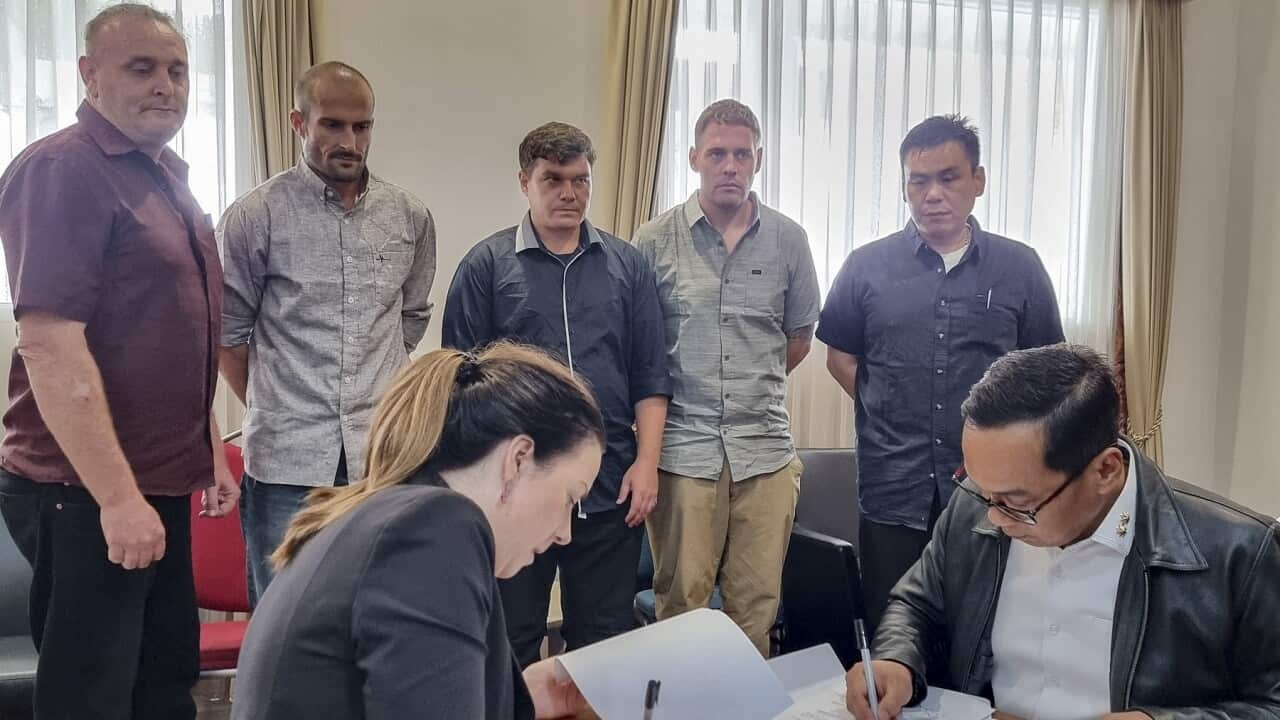Listen to Australian and world news, and follow trending topics with TRANSCRIPT
The five remaining members of the Bali Nine drug smuggling ring have returned to Australia - in time for Christmas.
In a statement, the men said they were "relieved and happy" to be home and are looking forward to reintegrating back into society.
The news was confirmed by Prime Minister Anthony Albanese on Sunday afternoon, following a deal made on the sidelines of the APEC Summit in Peru last month.
"The five men committed serious offences. Australia shares Indonesia’s concern about the serious problem illicit drugs represents. The Government will continue to cooperate with Indonesia to counter narcotics trafficking and transnational crime. These Australians served more than 19 years in prison in Indonesia. It was time for them to come home."
It's hoped Australian authorities can use the deal as a model for future cases.
So, how did it all unfold?
In 2005, nine Australians - eight men and one woman - were arrested for trying to smuggle more than 8 kilograms of heroin out of Bali.
The group had been under surveillance for a week, after a tip-off.
Several were sentenced to life in prison.
Those included Michael Czugaj, Renae Lawrence, Scott Rush, Martin Stephens, Matthew Norman, Si Yi Chen and Tan Duc Than Nguyen.
Despite pleas for clemency and diplomatic protests, the group's ringleaders - Myuran Sukumaran and Andrew Chan - were sentenced to death and executed in 2015.
It was a bold move by then-President Joko Widodo to demonstrate Indonesia's hard stance on drug smugglers.
And international leaders, including Australia's then-Prime Minister, Tony Abbott, condemned the decision, temporarily withdrawing Australia's ambassador to Indonesia in response.
"The foreign minister and I are here together to say to the world that Australia deeply, deeply regrets these executions in Indonesia. These executions are both cruel and unnecessary."
Three years later, Tan Duc Than Nguyen died from cancer in jail.
The only woman in the group, Renae Lawrence, was released that same year, in 2018.
Now, almost a decade on, and under the new leadership of President Prabowo Subianto, the remaining five members - Matthew Norman, Scott Rush, Martin Stephens, Si Yi Chen, and Michael Czugaj have been sent home.
The arrival of the group was kept secret, reports suggesting the five men were taken home on a Jetstar fight to Darwin.
At Bali's Denpasar International Airport, Australians say they think it is the right decision to allow the return of the five members of the Bali Nine.
Voxxie 1: "I think there was probably just a deal between the Indonesian government and Australia. I think it's for political reasons, I think if Indonesian is happy to give them back. If it works politically for them, if it works beneficials for the Australian-Indonesian relationship, then I am happy."
Voxxie 2: "I think from a human rights point of view it's time for them to come home."
When news of the discussions over the release of the remaining members began in November, there were questions about whether they'd serve the remainder of their sentences in Australia and whether it would involve a prisoner exchange.
But neither of those things has occurred.
Instead, they have been freed on humanitarian grounds - and ultimately will be considered free men despite Indonesia saying they were transferred in the status of prisoners.
They are also now banned from returning to Indonesia.
Prime Minister Anthony Albanese has described the deal as an act of compassion by Indonesia's president.
"I had the opportunity to speak to a number of the parents, last night, of these people. They are grateful that their sons have been able to return home. They did a serious crime and they have rightly paid a serious price for it."
As the men begin to resettle, they have been provided temporary accommodation by the federal government for rehabilitation.
They're soon be reunited with their families.













